G20 president S.Africa warns global turmoil hurts poorer nations
“War veterans in SADC must build synergies” – Mutsvangwa
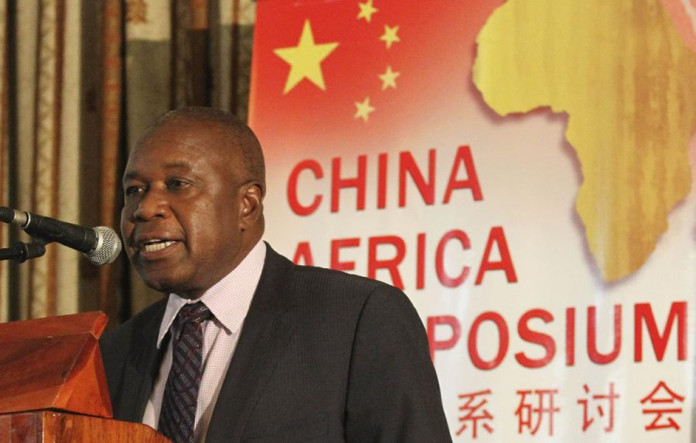
Southern African News / Christopher Mutsvangwa.
The former freedom fighters are undoubtedly a reservoir for institutional memory and the last trusted and solid frontier against imperial machinations. Our Senior Writer Lovemore Ranga Mataire (LRM) recently caught up with Zimbabwe’s Minister of Welfare Services for War Veterans, War Collaborators, Former Political Detainees and Restrictees Christopher Mutsvangwa (CM) who is also the national chairperson of the Zimbabwe National Liberation War Veterans Association to discuss various issues affecting the former combatants.
L.R.M: I want us to talk your recent meeting in Mozambique where you had discussions with other former liberation movements. Can you shed more light about this meeting and its objectives?
C.M: There is an institutionalised liaison body of the former liberation movements who are now ruling parties in various countries. It is an institutionalised relationship which started from our common hosting in Tanzania, which took upon itself the role of the headquarters of the OAU Liberation Committee. So we developed bonds because we shared a common struggle, against racism, against apartheid and colonialism which was European emanating from the Berlin Conference of 1884.
So we naturally developed our own bonds out of common purpose and this organisation took a formal nature in Frontline States, which then morphed into SADC and now that we have liberated South Africa, the last frontier of colonial racism, called apartheid, we now reconstituted this into this organisation of former liberation movements. The secretaries-general of the parties meet periodically and war veterans are natural members of this organisation. So there was President Zuma of South Africa, President Geingob of Namibia, the host President Nyusi and other parties were represented by their secretaries-general.
We, from Zimbabwe made a presentation on the steps that we have done, which included the establishment of a fully fledged ministry and the actual presence of the war veterans in the Politburo of the ruling party. This is a first and we would like to salute Cde President. Everybody was actually impressed by this Zimbabwean political innovation and when we said one of the main purposes was to incubate former liberation fighters into business people, they heard what Zimbabwe had done in terms of land restitution, the opportunities given to war veterans and now the mining rights which have reverted to the majority of the population and residing in the President according to the law which is coming up and how these are now being given to the general population, including allocation of a certain quantum to the war veterans.
They liked this and said Zimbabwe should chair a meeting, initially covering South Africa and Mozambique, to pursue regional and common business interests so that we incubate business people out of war veterans. So we are expecting the Ministry of Defence of South Africa which is still the resident Ministry of War Veterans (in South Africa) to come to Zimbabwe. They wanted to come last year but we are hoping they come as soon as the President comes back from his annual leave.
L.R.M: What exactly is the purpose of this meeting? What issues are likely to be on the agenda of the meeting?
C.M: The purpose of the meeting is to pursue business opportunities in the region, because this is a global economy and the region is an integrated economy. Basically, the synergies we want are Mozambique’s and its port access which is vital. The yardstick of how Zimbabwe’s economy has been revived is how busy Zimbabwe becomes an economic hinterland for Mozambican ports particularly the northern ports of Beira and Nakala. If we open up the northern corridor and we start having a lot of traffic moving through those ports it means Zimbabwe as an economic hinterland is now back in play.
Right now we are going 200 km all the way to Durban, it is inflationary, it clogs South African ports, and it delays remittances from our exports into banks because most of our exports are in Europe and it takes long periods before goods are delivered and payments made and we lose money. So we need to revive the Mozambican ports, which we fought for, which we defended during the Beira corridor expedition when Renamo wanted to threaten them. Now we have a new vitality with the discovery of coal in Tete and the huge gas deposits in southern Tanzania and northern Mozambique. The deposits will put the two countries at par with Russia, which is number one producer, and Qatar which the second producer. Zimbabwe has now more opportunities to explore which never existed before.
We are also looking at the logistics of the maize imports, of the emergence drought relief. The region is facing unprecedented crop failure because of the El Nino where 6-8 million tonnes will have to move into the region to stave off malnutrition and starvation. We see it as a military style operation, that’s the only way cargos of such magnitude can be moved in. So we see a role because in the whole region, the most organised people are the war veterans, who were able to organise hitherto tribal populations into national groups to stave off apartheid, colonialism and racism.
So we want to tap off into that history of organisation and into those bonds which we developed during our anti-colonial struggles. We work on the mantra of the President that no Zimbabwean should starve, so we want to work together.
L.R.M: I understand that your Ministry is currently in the process of realigning laws with the new constitution. What is the significant of this process to war veterans?
C.M: It’s important because a patchwork of regulations had been done in a piecemeal manner because the government didn’t have an overarching view, because remember the fight was collective but the welfare of those who fought the laws and the address of their welfare were done in a patchwork manner.
The way we became independent was through elections unlike Frelimo and MPLA, which was from the bush into office. Ours was like a virgin territory as nobody had ever visited such kind of integration of society and former contending armies into one army. So a lot of groups were left in the last 35 years and the so the constitution which we did with COPAC gives us an opportunity as a mature country for Zimbabwe to look back. We are now using the new overarching constitution as a framework where all those patchwork of laws can be put together so we that have a holistic approach of the issues emanating from the difficult period of our struggle where a lot of lives were lost, a people were wounded and deal with the whole carryover of post war trauma. We are hoping to have a legal framework that will assist us in addressing a myriad of problems affecting war veterans.
L.R.M: But all these issues you have mentioned need resources. How do you hope to generate resources to ensure that you deal with all the issues you have mentioned?
C.M: The budgetary constraints emanate from the fact that the economy has been under a lot of stress. This led to the retribution from the denied and disposed dominant economic class and its patrons in the West. But you can’t have an omelet without breaking the egg. We are glad that the West is now warming up to us and other countries are also coming. The old and the new emerging economies all want to invest in Zimbabwe.
L.R.M: But why has it taken so much time for the government to come up with such a ministry?
C.M: Like I mentioned before, we the government had other overarching concerns. Just imagine a country like the United States which got independence in 1773 only got a war veterans ministry in 1988 yet war veterans of the First World War had marched and demonstrated to Washington demanding recognition and compensation some years earlier. So in a way ours is late but in reality it’s early.
L.R.M: Briefly highlight some of the strides that your ministry has undertaken since you your appointment?
C.M: We have managed to set up a company which was approved by Cabinet in October last year. The company is called Power Zimbabwe where we are encouraging some competent new brand names in various sectors with partners to deliver topnotch goods and services not only to the Zimbabwean local market but the sub-region as well and if the need be the whole world. The Zimbabwean brain is the biggest asset that the country has more valuable than the resources underground. There are countries which have no underground resources but are doing well than Zimbabwe because they took advantage of their brains.
These countries include Singapore, Taiwan and Hong Kong. Similarly, we must now use minds that are well trained and are convertible as the labour market as the US dollar. The Zimbabwe brain performs well in Canada, Australia and even in Kuwait. Wherever the Zimbabwean brain goes it performs because it’s as convertible as hard currency as the US dollar. We now want to use that and to make a new approach to national development. It did not exist but it can only come from war veterans because they did a similar thing when they took the Zimbabwe brain and fashioned it to become the most potent force against Rhodesians. So innovation is in the DNA of war veterans.
L.R.M: What specifically will be the company dealing with?
C.M: We are working on bus assembly and we plan to engage some of the emerging global leaders in bus assembly and identify some competent Zimbabwean companies as our partners. We are synergizing global competency and local business acumen and we are like marriage makers. We are also looking at going into chrome mining. We are happy that the government has agreed that chrome must come back into the global trade instead of waiting for the day we will benefit. We are also looking at the land that the President provided so that we are able to supply before to huge markets in Europe.
We want to use the global innovation that we employed during the war when we established relationships with China, Russia and Romania. We have produced a topnotch army, police and military which is ISO certified. We delivered an educated product second to none and we believe we can use our organizational capacity to uplift the Zimbabwean economy.
L.R.M: What is the state of the Zimbabwe National Liberation War Veterans Association that you lead as the national chairman?
C.M: The association is strong and confident, its united and looking up to make full use of opportunities offered by the new ministry, their new governance role as a new ministry and their political leadership role in the (Zanu PF) Politburo which gives direction to the country. So they are confident and grateful to his Excellency the President and First Secretary Cde R.G. Mugabe for this recognition which is the first in the region.
L.R.M: I ask about the state of your association in light of recent reports of some of your members purporting to have formed a splinter association and have passed a vote of no confidence in your leadership.
C.M: The bane of the association which His Excellency correctly assessed was their welfare and their general conditions of prosperity, their negative conditions of prosperity. The war veterans lost a good chunk of their lives while they were busy in their chosen national military assignments. Other people of their generation were preparing for their own lives either at school or doing something. So when independence came, they obviously lacked certain essential skills needed for an independent country. They found themselves behind and it is this issue that has not been properly addressed.
L.R.M: Which issue are you referring to? Do you mean their general welfare?
C.M: Yes, and even their integration into society. The remedial measures needed for the war veterans to catch-up to the lost years that have never been definitely addressed. So the new ministry is actually an opportunity of trying to comprehensively address that issue. The government was right in being preoccupied with consolidating independence fending off the various challenges to the new state which took different forms and guises, terminating with the regime change agenda and the sanctions of the last era. But we are over that now. Zimbabwe can safely say it’s on the beach now. It has traversed the storming, political and diplomatic, so now there is space at the level of government and the party to start to comprehensively look at the issue of war veterans.
L.R.M: Minister, you still have not answered my question. What is your response to those within the war veterans association purporting to have passed a vote of no confidence in your leadership?
C.M: It’s the bane of poverty, which arises from precisely what I have alluded to, you know the destitution of war veterans makes them very vulnerable especially to young and ambitious unprincipled arrivistes in the party who think that power can easily be grabbed and can seize it in whatever direction. So they are jealous, they envy the esteem of the war veterans with society and they want to hijack it and appropriate it for themselves.
They want that aura associated with heroism of the war, the organisational capacity and the moral standing of the war veterans. They want to abuse it so they look at the vulnerability of war veterans, of course, they are poor, and they use that vulnerability to all sorts of compromises. So some few war veterans who are really destitute, who are on the margins of the leadership, they are coaxed, cajoled or hoodwinked into trying to set up a splinter organisation.
L.R.M: Can you be specific? Who coaxed them? Who hoodwinked them?
C.M: Like I mentioned, these are arrivistes in the party, some people who came in the party in the past independence era who have no history of the struggle, so they have no particular respect for the party, they think that all these years war veterans have not been at the centre of power. Some of them are truant members who ran away from the war. They never participated and instead went to school in America, made names for themselves for criticizing the struggle and the post independence order of President Mugabe.
Then afterwards they were welcomed back into the party because at a certain stage in the revolution, you get so many enemies arraigned against you, it is proper that you unite all the forces and that’s what happened in the last ten years. It was important that we embraced people of every hue and stripe back into the party to form a united front and minimise the chances of those people being used by our enemies. So we embraced them back into the party.
L.R.M: So you think the current contradictions in the party are as a result of these truant members who have joined the party in the post independence period?
C.M: Yes, there is a certain Professor that I will not mention by name, who thinks that the status and glories accorded to him in the party and with an overblown ego thinks that he can one day be the leader. He suffers from mental amnesia about his truancy at the crucial stage of the armed struggle. And has affinity to his uncle who was dethroned from the army and later commanded an army against the liberation struggle. Everybody knows Ndabaningi Sithole and retrogressive role in the struggle. This professor is on record trying to seek post-humus rehabilitation for Sithole. He wanted hero status for his uncle. He wanted national hero status for Sithole something which is an anathema.
He wanted Sithole to go and sleep at the same place with Joshua Nkomo, Simon Muzenda, Josiah Tongogara and Nikita Mangena. How can that be? That would have caused ructions at the Heroes Acre. But this professor had the temerity to bring the issue to the President because Ndabaningi Sithole is his uncle. How can a man who commanded soldiers against people he had originally send to war, you know he had his own army in 1978 which was later bombed by Ian Smith for indiscipline, so even Smith couldn’t countenance them. They had been deployed against their erstwhile comrades as the war became thick. So his allegiance is to a clan, to a family, to a village, to a totem those things are all contrary to the ethos of the liberation struggle.
Those things are contrary to the ethos, for us when you joined the war, you didn’t even remember your name. You were given a new name. The only name you remember was that you were a liberation war fighter for Zimbabwe. We couldn’t be identified from where you came from. That’s why we are so bonded and for him to wade into the waters of such a bonded organisation such as the war veterans in the vain hope that you can create through himself and his youthful cohorts in the party, they are youthful cohorts in the party who listen to him who think that they can refashion the war veterans. It’s not possible, so obviously people overlook the fact that war veterans were revolutionaries, they were not mercenaries working for Nkomo or Mugabe; these are fellow revolutionaries who happened to have been leaders whom we were following.
They mistake our allegiance to the President, which is earned and our allegiance to Nkomo, which was earned, they mistake it to allegiance to a mercenary, to a military commander. We are different, this is self chosen loyalty given to a person. It’s a cadreship relationship. But they think that they can just come and seize it and direct it into any direction and that’s why the whole splinter movement came to naught.
L.R.M: But why do you think the status and sacrosanct of war veterans is now being challenged by people you described as having joined the party in the post-independence era?
C.M: The tragedy is that these people think that war veterans are a tribe from Mozambique of Zambia. They forget that war veterans come from each and every village in Zimbabwe. So there is a misnomer which is coming up, a disturbing misnomer which begins to see war veterans as if it’s a tribe from exile. And then they create an artificial barrier between war veterans and the ordinary people and these people calling themselves G40 they now claim that those who didn’t go to war are the majority and we are diminishing.
L.R.M: You are talking about the G40 but others in the party are saying there is no such a thing. That it’s a figment of imagination of those who want to create disharmony in the party? Does such a group really exist?
C.M: The criteria for its identification and existence can be traced to the person who authored it. It was in an article which appeared in the Press where the same professor talked about the G40. How do you deny something which has been penned by the person who organises it? How do you deny it for him?
L.R.M: Was he not referring to an age group rather than a grouping of people within Zanu-PF?
C.M: But why discriminate, because every country has a relay, you pass on from generation to generation. It’s simply because for him he has irreverent attitude against those who fought in the war in the 1950s and 1960s. And he has a patronizing attitude on the young people because that’s where he can claim leadership based on his age and experiences but if he goes to his peers who are 50 and 60, he can’t function. He chooses a generation where he can be the patriarchy and frowns upon an older generation who are his peers who can question him.
L.R.M: Honourable Minister, are you saying there are no bad apples in your association? I say this in the context of President Mugabe’s closing remarks at last year’s Zanu-PF Victoria Falls conference where he bereted a kind of entitlement attitude by some war veterans.
C.M: I will not comment about what the President said. But like I said the war veterans are not a tribe from exile. So in so far as their conduct and character, it is as reflective of the country to which they belong to. They are only a sample of Zimbabwe; remember they come from every place self chosen to go to war. This idea of wanting to turn them into a tribe of exile is where the problem is. To be trained and become militant does not give you any new national characteristics but only enhances your Zimbabweaness. War veterans are just a random sample of the totality of Zimbabweans.
L.R.M: I know you said I should not ask about the President but a lot of people deduced that those sentiments were targeted at you?
C.M: I will not comment on that, I was at the conference, he could have mentioned my name, and he didn’t mention my name. So I think on that one, the President has his own Press Secretary, he is the only one who can answer on that one.




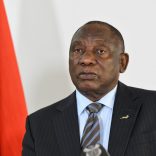
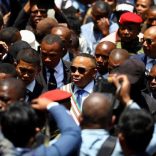
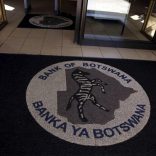
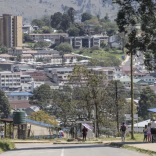



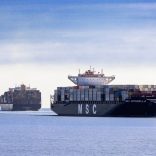

Leave a Reply
Be the First to Comment!
You must be logged in to post a comment.
You must be logged in to post a comment.